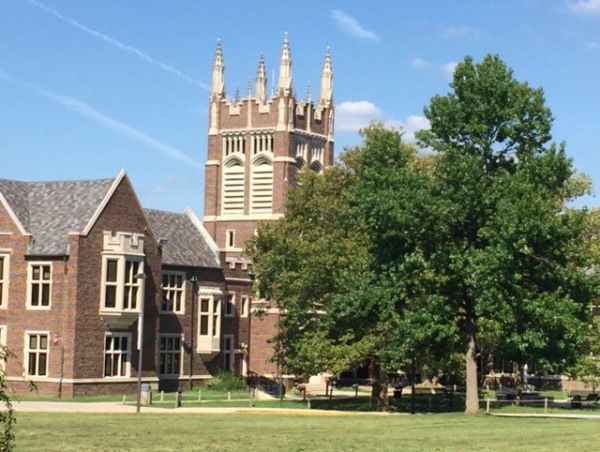By Erica Chayes Wida, Staff Writer
Amid national political upheaval, Princeton High School slid under the lens after an assembly took an unexpected turn on Nov. 14. Alison Macrina, an Internet privacy activist and founder and director of the Library Freedom Project, spoke to students about Internet safety. Her presentation took a political and emotional turn, causing tense student reactions both in school and online.
Many accounts have since spiraled through social media about the assembly PHS Principal Gary Snyder called an “anomaly.”
Ms. Macrina came to PHS as part of a community program related to digital citizenship, sponsored by Princeton Public Schools and the Princeton Public Library. Library Executive Director Brett Bonfield had recommended Ms. Macrina, who he’d seen lead professional conferences, workshops at libraries, and whose Library Freedom Project had won several awards. She hosted two assemblies on Nov. 14 — one for underclassman and one for upperclassmen.
According to Mr. Snyder, the goal of the assembly was to educate students on digital privacy and online safety and though those points were made, Ms. Macrina’s presentation took a turn into rocky anti-Trump, political territory when it came time for the Q&A. Ms. Macrina used language such as “white nationalism,” “racist and sexist trolling,” and “white privilege” to the group — nearly 800 14- and 15-year-old students.
Some students were offended by Ms. Macrina’s statements, some were supportive, and some began shouting, laughing or yelling.
“I don’t say this lightly: there is an art and a skill to present to an auditorium of high school kids. A non-controversial, non-political presentation can go awry,” Mr. Snyder said, emphasizing how teachers and students must both be prepared to discuss sensitive topics such as race and politics.
Ms. Macrina could not be reached for comment.
According to Mr. Snyder, neither he nor the faculty members present heard students make derogatory statements during the assembly. Ms. Macrina, on the other hand, made clear on her Twitter account certain students reacted and called out at her, mocking and in favor of her references to “racist and sexist trolling.”
Both Mr. Snyder and Mr. Bonfield apologized to students and to parents about the speaker’s direction and delivery.
In a statement, Mr. Bonfield said, “The presentation at Princeton High School was different from the ones I have seen in the past and was different than what I expected to see this week, and it was not appropriate. In addition, the speaker did not engage in civil discourse and the outcome was the opposite of what I anticipated.”
“We’ve had large group events before — presentations, workshops, dialogue between speakers and students. All have been more than fine. This event is not typical,” Mr. Snyder said by phone. “But it happened, we’re replaying it and looking toward the future to prevent it.”
For PHS students who acted inappropriately, Mr. Snyder explained measures were taken to establish reasons for acting out and appropriate consequences. Following the heated assembly, teachers also led constructive discourse in the classrooms regarding the sensitive topics addressed.
“Placing yesterday into context and using a phrase from your history courses, I’d call yesterday a ‘sign of the times.’ We live in a turbulent time with emotions running high,” Mr. Snyder said in a statement to students the morning of Nov. 15. “While I can’t make excuses for our speaker, my perception is that she found herself caught up in the post-election climate and allowed that to influence her presentation.”
Ms. Macrina’s sentiments continued in a thread on Twitter after the event, explaining to followers the unsettling reactions she received from an unnamed high school.
“I’m astonished but also not. This is our world. White students cheer swastikas, and the offensive one is the one who calls that racist,” she wrote.
The dialogue grew rapidly as students replied — some looking to understand or clarify the actions of their peers, others to justify them, and one vowing to harass Ms. Macrina with lewd language and derogatory threats.
Mr. Snyder ensured the school admonishes students and informs his or her parents when issues such as cyber bullying and harassment are reported, even when outside of school. He was unable to specify, however, if this particular student was reprimanded. There is also a Princeton Public Schools policy that restricts social media communication between students and teachers, but non-staff, i.e. those hired to speak at PPS, are not included.
“We are part of a participatory culture that not only consumes news and information, but contributes to the production of that news,” Mr. Snyder told his students. “Your, and our, ability to do that in a productive and meaningful manner is critical for the times in which we live. Yesterday, like many days, didn’t go as planned. Our strength is then to decide how best we can respond in adverse situations. As always, our focus is to ‘Live to Learn and Learn to Live.’ ”

